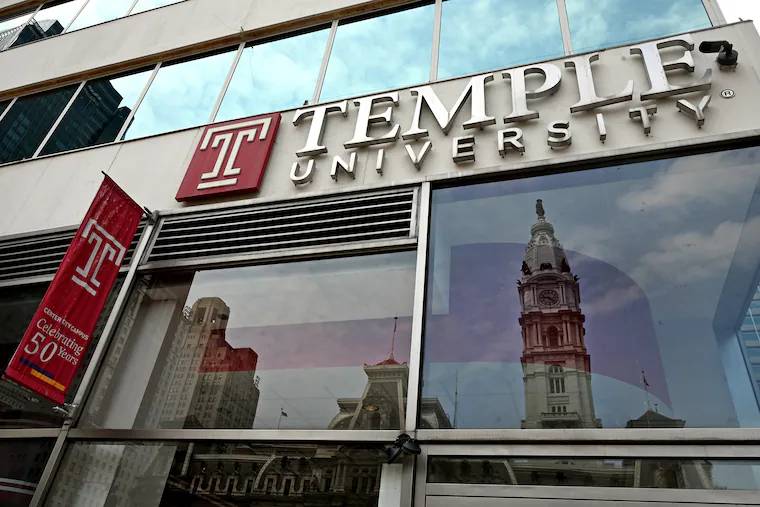Temple will phase out Chinese scholarship program after warning letter from House committee

Temple University plans to phase out a partnership with the Chinese Scholarship Council that brought 25 to 35 students to the school each of the last two years.
The move comes after Temple received a letter in July from the Republican-led U.S. House Select Committee on the Chinese Communist Party, warning the school of national security concerns about the China-funded program that promotes international exchanges and awards scholarships.
“CSC purports to be a joint scholarship program between U.S. and Chinese institutions; however, in reality it is a CCP-managed technology transfer effort that exploits U.S. institutions and directly supports China’s military and scientific growth,” Rep. John Moolenaar, (R., Mich.), chair of the committee wrote.
“We urge you to assess whether allowing CSC-sponsored PRC graduate students to study and conduct research in cutting-edge technology at TU aligns with American interests and U.S. national security policies,” Moolenaar wrote.
He asked the university to produce documents and respond to more than a dozen questions about the program, including whether the students worked on research funded by any U.S. government entity and whether the council or any other Chinese entity provides other funding to Temple.
“While we are confident that our program complied with applicable directives and requirements when it was initiated, upon review, we have decided to phase out this program,” Temple President John A. Fry said in a communication to the campus community last month.
While no additional students will be enrolled, those currently in the program will have the opportunity to complete their degrees, Fry said.
Other colleges that were contacted by the committee also have closed or are closing their programs, said Jack Clem, the committee’s press secretary. Dartmouth College had already made the decision to end the program before receiving the letter, according to the Dartmouth, the student newspaper. The University of Notre Dame told the Associated Press that it also had begun a process to end the program earlier this year. And the University of Tennessee terminated its program.
Many students from China come to the United States to attend its colleges and universities. China is second only to India in the numbers of students it sends each year. In 2023-24, 277,398 students came from China to study in the United States, according to the Institute of International Education.
Temple said it entered into the partnership with the council in 2023 to fund scholarships for Chinese doctoral and master’s degree students. The first group arrived in fall 2024 with the goal of promoting cultural and educational exchange and expanding on Temple’s commitment to international education, Temple spokesperson Steve Orbanek said.
The council selected the scholarship students, who then applied to Temple through its regular admissions process, he said.
“Once admissions decisions were made, Temple then shared the final list of admitted students with CSC,” he said.
The House select committee’s focus on the council continues longstanding governmental scrutiny of Chinese students and scholars that has ramped up since President Donald Trump took office in January.
“It’s been a continual chipping away” at anybody with any Chinese background and represents a threat to Chinese in America, said Helen Zia, founder and director of the Vincent Chin Institute, which fights against anti-Asian hate. “The ultimate goal is to have no Chinese students in America.”
With the tensions between U.S. and China, Zia anticipates things will only get worse.
Zia noted the case of a Chinese American neuroscientist at Northwestern University who died by suicide months after her lab was shut down in 2024 amid a government investigation into her research and ties to China, NBC news reported. Jane Wu had not been charged. Her family earlier this year filed a lawsuit against the school.
Temple University physics professor Xiaoxing Xi said he’s surprised Temple didn’t dump the program sooner, given what’s been happening around the country.
“For a long time, the FBI has seen Chinese academics and students as nontraditional collectors for China,” he said. “Government officials have claimed that Chinese students steal intellectual properties for China. … I will not be surprised if there will be no Chinese students in the U.S. in the future.”
» READ MORE: Appellate court revives suit from Temple professor falsely accused of spying for China
Xi was accused by the federal government of spying for China in 2015 and arrested by armed agents at his home. Months later the charges were dropped, but not before his life was upended. Days before his arrest, he had told The Inquirer he was offered the chance to lead Temple’s physics department. But by the time charges were dropped and he was allowed to return to campus, the position had been filled by someone else. (University officials have disputed that plans for Xi’s chairmanship were concrete.)
In 2023, he said that his research continued to be affected and that his lab, once full of assistants, had been reduced to just one other person and that he seeks only one government grant at a time to avoid drawing more scrutiny.
“Based on my experience we know that the government could twist anything to charge a person, even if you have done nothing wrong,” he said in an August 2024 interview with the MIT Science Policy Review. “It makes us very fearful of doing anything.”
Xi has sued the federal government and has spoken widely about his case, including testifying before Congress.
» READ MORE: A year later, Temple professor haunted by spying allegations
“I think — without data to support it — that I am possibly the most knowledgeable physicist on issues related to the false espionage accusations of scientists of Chinese descent, because I follow it. I follow the events, I read the court documents,” he said in the policy review interview.



